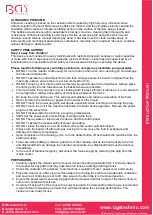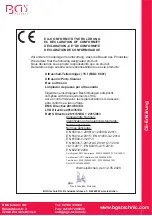
BGS technic KG
Bandwirkerstr. 3
D-42929 Wermelskirchen
Tel.: 02196 720480
Fax.: 02196 7204820
www.bgstechnic.com
© BGS technic KG, Copying and further use not allowed
ULTRASONIC PRINCIPLE
Ultrasonic cleaning is based on the cavitation effect caused by high frequency ultrasonic wave
vibration signal in the fluid. Microscopic bubbles are formed, and they implode violently causing the
cavitation which create an intense scrubbing action on the surface of the item being cleaned.
The bubbles are small enough to penetrate microscopic crevices, cleaning them thoroughly and
consistently. Ultrasonic cleaning is extremely effective at removing dirt and grime which would
normally require tedious manual cleaning by hand. It has been used to clean a wide variety of
instruments and mechanical parts such as carburetors, returning them to almost “like new” condition
without damage to delicate parts.
SAFETY PRECAUTIONS
Keep it away from children!
This device is not intended to use by individuals with restricted physical, sensory or metal capacities
or those with lack of experience or knowledge, include children, unless they are supervised by an
individual who is responsible for their safety or have received training in operating the device.
Please read the following very carefully as failure to comply may invalidate your guarantee.
•
DO NOT run the cleaner continuously for more than one hour at a time, as doing so can damage
the internal components.
•
DO NOT operate the unit without fluid in the tank. Always ensure the fluid is no higher than the
max mark, always ensure there is a minimum depth of 7cm.
•
DO NOT drop any Item into the tank as this may cause damage to the transducer. Always place
the items gently into the tank and use the basket whenever possible.
•
The more items that you place in your cleaning bath the less efficient it will clean. It is not advised
to overlap items. Always allow plenty of clear space between the items.
•
Do keep the lid on during use. This will prevent splashes and reduce evaporation of the fluid.
•
Never immerse the machine or power cord in water or other liquid.
•
DO NOT touch the power plug with wet hands, especially when inserting or removing the plug.
•
DO NOT touch the unit if the machine has fallen into water during operation. Remove the power
plug from the socket first.
•
DO NOT disassemble the machine, except by professionals.
•
UNPLUG the power source while filling or emptying the tank.
•
DO NOT spray water or liquid over the device and the control panel
•
DO NOT operate the cleaner without proper grounding.
•
DO NOT place the device on a soft surface, where the vents could be blocked.
•
Always turn the heater off after using as leaving it on can cause the fluid to evaporate and
damage the internal components.
•
Upon completion of the cleaning cycle, turn the heater button off and isolate the machine from the
electrical supply.
•
Take care when adding or removing items from the cleaning tank as the fluid Is likely to be hot
and displaced fluid can damage the internal components. Any displaced fluid must be dried up
immediately.
•
In the event of failure/emergency, disconnect the mains supply by removing the plug from the
mains socket.
PREPARATION
1. Carefully unpack the cleaner and remove all traces of packing materials from it. Visually inspect
the cleaner for any parts that may have become loose or damaged during transit.
2.
Check the contents of the delivery: main machine, soundproof cover, power cord, and manual.
3. Place the cleaner on a flat, clean surface where the cooling fans will receive adequate ventilation
and ensure all controls are set to off. Also ensure the drain tap is in the closed position.
4. Ensure the power lead is securely plugged into the cleaner and that no part of the lead is likely to
come into contact with moisture.
5. Carefully fill at least 'h of the tank with a solvent solution. For demanding cleaning we recommend
a small amount of washing up liquid, this will help increase the cleaning performance. The
cleaner is now ready for use.




















